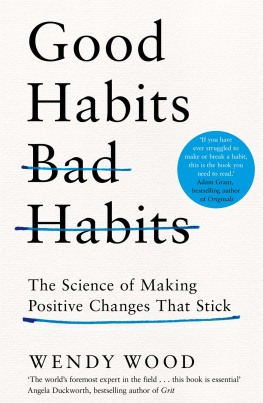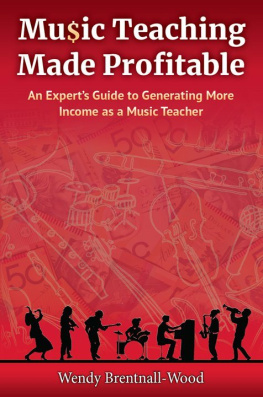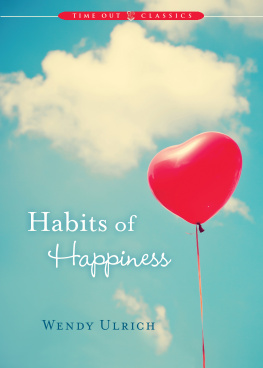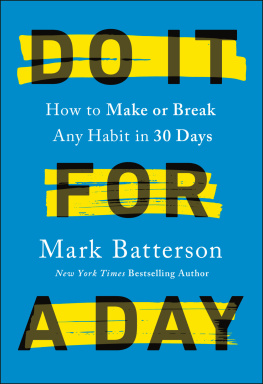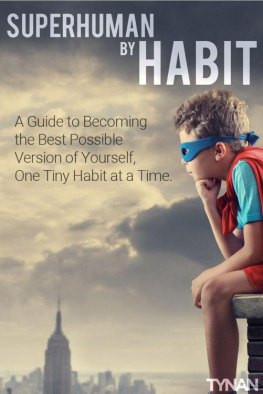Good Habits, Bad Habits
Wendy Wood is Provost Professor of Psychology and Business at the University of Southern California. She has written for the Washington Post and the Los Angeles Times, and her work has been featured in the New York Times, the Chicago Tribune, Time magazine, and USA Today, and on NPR. She lectures widely and recently launched the website myhabitlab.org to convey scientific insight on habit to the general public.
Acknowledgments
I have been studying peoples habits for almost thirty years and have published over a hundred articles in scientific journals. This research was so exciting, for a long time I was too engrossed to consider writing a popular book about it.
But whenever I walked into a bookstore, it was clear that someone needed to. In books written for a general audience, groundbreaking insights about the science of habits were often missing or, worse still, misconstrued. Popular books and blogs were decades behind the rapidly developing research. And each new book seemed to get further and further away from the reality we were seeing in the lab.
So I finally wrote a proposal, guided by my marvelous agent, Richard Pine at Inkwell. He helped to turn my stumbling initial descriptions into a proposal that was impressive enough to attract the support of Colin Dickerman at Farrar, Straus and Giroux. With Colins brilliant editing and Richards wise counsel, a book emerged; this book just wouldnt have happened if not for the guidance and constant advice of these two smart people. I also thank the talented William Callahan for making anything I sent to him delightfully more interesting.
My hundred-page proposal took a year to write, and at that point I thought I had to be almost donebut no. I had two more years of work and many, many discarded drafts before the manuscript finally took shape (it seems that you have to throw away a book to write a book). Through this time, I was fortunate to be funded by the University of Southern California and by the INSEADSorbonne University Behavioral Lab. With the support of professor Pierre Chandon and the marketing group at INSEAD, I was awarded a position as INSEADSorbonne University Distinguished Visiting Chair in Behavioral Sciences. I completed the second and third book revisions during my stay in Paris. My time at INSEAD was a great opportunity to interact with and learn from my French colleagues. The wine and cheese werent bad, either.
The best books grow with input from many people. Most of all, I appreciate the scientists who did the remarkable research I included in my book. In addition, it was inspiring to get advice from Angela Duckworth, Jamie Pennebaker, Jonah Berger, Sam Gosling, Bob Cialdini, Tim Wilson, and Adam Grantall award-winning scientists and writers. I continue to read their books with wonder.
As this book developed, my dear friend and longtime collaborator David Neal provided thoughtful commentary and supportive feedback (Hey, lets meet for a glass of wine). Generous colleagues who commented on parts of the book include Barbara Knowlton, David Neal, David Melnikoff, John Monterosso, and Bas Verplanken. My graduate students were a continual source of inspiration, along with the talented Kristen Lee, who handled all of the references.
Families dont sign on to writing a book, and most probably wouldnt if they had a choice. Having been given no choice, my family was stalwart in its support. My dad, also a professor, loved to give advice on... well, pretty much everythingbut specifically on writing a book. I wish he were here to see it finished, and, of course, to tease me mercilessly about any parts that didnt meet his standards. My amazing sons, Dylan and Garrett Stagner, were never too tired of hearing about the book to send me encouragement along with links to habit-related blogs and podcasts (although I admit that I still havent listened to the end of that two-hour one). And, despite their initial discomfort at being included in this book, they ultimately relented and let me mention each of them exactly once.
Most of all, I thank my beloved husband, Steve Ortmann, who is the most generous person I know. He was a full partner in this undertaking, as he has been in every aspect of our lives together. This time, he had to be cheerleader, editor (who was required to love everything he read), sounding board, writing guide, and, yes, world traveler willing to quit his job and spend eight months with me in Paris. If you are wondering what I did to deserve such support, well, I wonder, too (but Im not going to question it). Mon amour, tu est la cerise sur mon gteau.
Bibliography
Aarts, Henk, Bas Verplanken, and Ad van Knippenberg. Habit and Information Use in Travel Mode Choices. Acta Psychologica 96, nos. 12 (1997): 114. https://doi.org/10.1016/s0001-6918(97)00008-5.
Adams, Christopher D. Variations in the Sensitivity of Instrumental Responding to Reinforcer Devaluation. Quarterly Journal of Experimental Psychology Section 34B, no. 2b (1982): 7798. https://doi.org/10.1080/14640748208400878.
Adams, Christopher D., and Anthony Dickinson. Instrumental Responding Following Reinforcer Devaluation. Quarterly Journal of Experimental Psychology Section 33B, no. 2 (1981): 10921. https://doi.org/10.1080/14640748108400816.
Ahern, Jennifer, Claire Margerison-Zilko, Alan Hubbard, and Sandro Galea. Alcohol Outlets and Binge Drinking in Urban Neighborhoods: The Implications of Nonlinearity for Intervention and Policy. American Journal of Public Health 103, no. 4 (2013): e81e87. https://doi.org/10.2105/ajph.2012.301203.
Ahrnsbrak, Rebecca, Jonaki Bose, Sarra L. Hedden, Rachel N. Lipari, and Eunice Park-Lee. Key Substance Use and Mental Health Indicators in the United States: Results from the 2016 National Survey on Drug Use and Health. Rockville, MD: Center for Behavioral Health Statistics and Quality, Substance Abuse and Mental Health Services Administration, 2017.
Ajzen, Icek. Residual Effects of Past on Later Behavior: Habituation and Reasoned Action Perspectives. Personality and Social Psychology Review 6, no. 2 (2002): 10722. https://doi.org/10.1207/S15327957PSPR0602_02.
Alcohol Use: Data and Statistics. World Health Organization. Accessed February 16, 2019. http://www.euro.who.int/en/health-topics/disease-prevention/alcohol-use/data-and-statistics.
Aldrich, John H., Jacob M. Montgomery, and Wendy Wood. Turnout as a Habit. Political Behavior 33, no. 4 (2011): 53563. https://doi.org/10.1007/s11109-010-9148-3.
Alexander, Bruce K., Barry L. Beyerstein, Patricia F. Hadaway, and Robert B. Coambs. Effect of Early and Later Colony Housing on Oral Ingestion of Morphine in Rats. Pharmacology Biochemistry and Behavior 15, no. 4 (1981): 57176. https://doi.org/10.1016/0091-3057(81)90211-2.
Alexander, Bruce K., and Patricia F. Hadaway. Opioid Addiction: The Case for an Adaptive Orientation. Psychological Bulletin 92, no. 2 (1982): 36781. https://doi.org/10.1037/0033-2909.92.2.367.
Alexander, David L., John G. Lynch, and Qing Wang. As Time Goes By: Do Cold Feet Follow Warm Intentions for Really New Versus Incrementally New Products? Journal of Marketing Research 45, no. 3 (2008): 30719. https://www.jstor.org/stable/30162533.
American Psychological Association. 2015 Stress in America. Accessed March 13, 2018. http://www.apa.org/news/press/releases/stress/2015/snapshot.aspx.
Amodio, David M. Social Cognition 2.0: An Interactive Memory Systems Account. Trends in Cognitive Sciences 23, no. 1 (2018): 2133. https://doi.org/10.1016/j.tics.2018.10.002.
Anderson, Brian A. The Attention Habit: How Reward Learning Shapes Attentional Selection.

